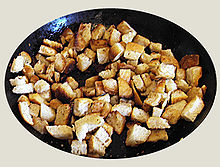This is an old revision of this page, as edited by Bbb23 (talk | contribs) at 14:56, 21 March 2022 (Undid revision 1078400517 by Combustible Vulpex (talk) WP:OLINK). The present address (URL) is a permanent link to this revision, which may differ significantly from the current revision.
Revision as of 14:56, 21 March 2022 by Bbb23 (talk | contribs) (Undid revision 1078400517 by Combustible Vulpex (talk) WP:OLINK)(diff) ← Previous revision | Latest revision (diff) | Newer revision → (diff) Rebaked bread For the Québecois food, see cretons. For other uses, see Crouton (disambiguation). Close-up of croutons on a salad. Close-up of croutons on a salad. | |
| Place of origin | Unknown; possibly France |
|---|---|
| Main ingredients | Bread, oil or butter, seasonings |
| Food energy (per 100 g serving) | 420 kcal (1758 kJ) |

A crouton /ˈkruːtɒn/ is a piece of rebaked bread, often cubed and seasoned. Croutons are used to add texture and flavor to salads—notably the Caesar salad—as an accompaniment to soups and stews, or eaten as a snack food.
Etymology

The word crouton is derived from the French croûton, itself a diminutive of croûte, meaning "crust". Croutons are often seen in the shape of small cubes, but they can be of any size and shape, up to a very large slice. Many people now use crouton for croute, so the usage has changed. Historically, however, a croute was a slice of a baguette lightly brushed with oil or clarified butter and baked. In English descriptions of French cooking, croûte is not only a noun but also has a verb form which describes the cooking process that transforms the bread into the crust.
Preparation
The preparation of croutons is relatively simple. Typically the cubes of bread are lightly coated in oil or butter (which may be seasoned or flavored for variety) and then baked. Croutons can also be cut into sticks. Some commercial preparations use machinery to sprinkle various seasonings on them. Alternatively, they may be fried lightly in butter or vegetable oil, until crisp and brown, to give them a buttery flavor and crunchy texture. Some croutons are prepared with the addition of cheese.
Nearly any type of bread—in a loaf or pre-sliced, with or without crust—may be used to make croutons. Dry or stale bread or leftover bread is usually used instead of fresh bread. Once prepared, the croutons will remain fresh far longer than unprepared bread.
List of possible ingredients
- bread
- garlic
- butter or oil (e.g., olive oil or rapeseed oil)
- Parmesan
- herbs
- spices (ground or whole)
Gastronomy
A dish prepared à la Grenobloise (in the Grenoble manner) has a garnish of small croutons along with beurre noisette, capers, parsley, and lemon.
Dried and cubed bread is commonly sold in large bags in North America to make Thanksgiving holiday stuffing or dressing, although these are generally different from salad croutons, being only dry bread instead of buttered or oiled and with different seasonings, if any.
See also
References
- ^ Ranken, M.D.; et al. (1997). Food Industries Manual. Springer Science & Business Media. pp. 464–465. ISBN 0751404047.
- ^ Davidson, Alan (2014). The Oxford Companion to Food. Oxford University Press. p. 233. ISBN 978-0199677337.
- Nargi, Lela (2008). The Farmer's Wife Comfort Food Cookbook. MBI Publishing Company. p. 41. ISBN 978-1610600521.
- Grimes, Lulu. "How to make croutons". BBC Good Food.
External links
| Bread | ||
|---|---|---|
| Types |  | |
| Ingredients | ||
| Equipment | ||
| Processes and techniques | ||
| Uses | ||
| Other | ||
| List articles | ||
| Food garnish | ||
|---|---|---|
| Food |  | |
| Dessert | ||
| Drink | ||
| See also | ||

